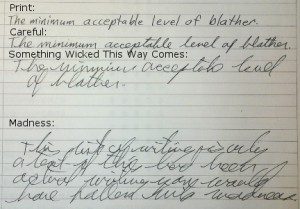Today’s post, unless I’ve miscounted, is post number 37 which means I’m 10% finished with this daily project. Since I’m coming down off a minor migraine, I’ve decided to assess what’s happened thus far and where I hope things will go from here.
I went in to this project with very little plan and I was worried about having enough interesting ideas. (Ha Ha Ha. Too late, DL, looks to me like you’ve already run out. That’s funny. Ha ha. I get it. Now shut up.) My friend Steve was much wiser in that respect, and his new daily poetry project looks interesting, too. On the other hand, having no plan gives me a much broader range of topics. But when you can go anywhere, where do you go first?
I keep a notebook of possible topics, but prefer to blather on about whatever strikes my interest on the day–hence haircuts and lots of stuff about marking exams. I want to keep a good portion of the possibles list as “I Got Nothin'” back-up topics.
I also decided by the end of the first week to limit myself to one hour of writing for each post. One of the reasons I haven’t done anything like this before–and also why I’m dubious about daily diaries–is the time spent on things that don’t necessarily pay. The consequences of the time limit have been mixed. Although it forces me to write quickly–I don’t count any prior notes or scribbled lines toward the time limit– I feel a number of the entries just kind of stopped without a satisfying concluding punch–The Corpse of Peace, for example.
I’ve also been worried about balancing the mix of serious, funny, seriously funny, falsely profound and downright tragic, but that might be a result of deciding how honest to get with all of this. I also don’t want this to be another version of the barely breathing The Crazy Japan Times, although I may start cross-posting some stuff over there.
I do have an eye toward readership–the blog’s been doing reasonably well thanks to Brad Dowdy of The Pen Addict including one of my posts in his regular Ink Links. (Note: that’s NOT the Ink Links my post is in.) I’ll probably add a tip jar one of these days, although that possibility changes depending on what day it is.
I also want to work on a couple connected series of posts, one about Albania and the Peace Corps, one about university and why I am a grad-school dropout and one tentatively involving “Daddyhood”. (Once again, though, I’m saving those for the “No, really, I got nothin’. Really, I don’t.” days
Thanks to everyone who’s commented, either on a post or on Facebook. I hope you’ll share these with others. I also hope I manage to keep your interest the rest of the way, despite cheating posts such as this.

